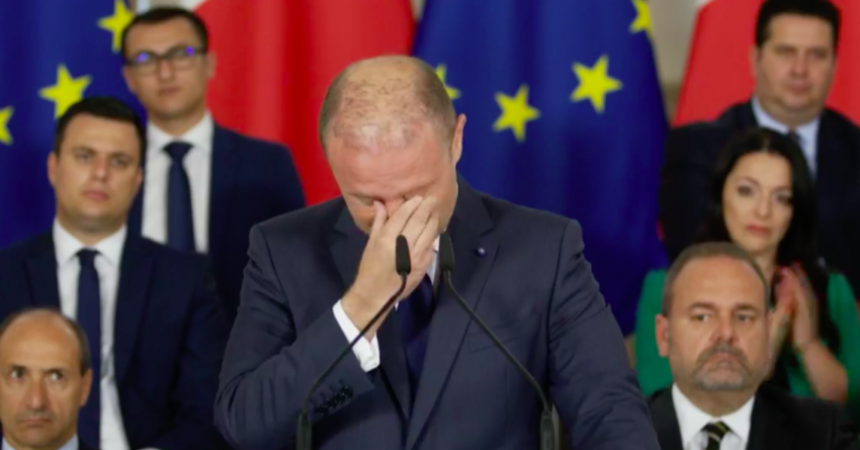On 5 April, Labour’s deputy leader, Daniel Micallef, said in an interview that the Labour Party had no problem apologising to those (presumably, Labour supporters) who felt hurt by the string of shocking revelations of corruption implicating so many Labour party officials.
Micallef’s comments were made following an opinion piece by Malta’s former President Marie Louise Coleiro Preca published by Malta Today in which she wrote that “the Labour Party owes the country and its supporters an apology”.
Many observers were quick to point out that, as things currently stand, an apology by the government and its officials without following through with any tangible actions, carries about as much weight as a six-year-old apologising after being caught hitting a younger sibling and realising the easter chocolates are about to be lost – “I’m sorry, can I still have my dessert?”.
Fake or real?
Apologies play an important role in society. They have the power to heal humiliation or grudges and go a long way in restoring and maintaining the bonds of social relationships, not just between individuals but also between groups. In this respect, Coleiro Preca’s sentiment is perfectly understandable. In the public debate, apologies help solidify some level of trust between public officials and the public at large. Conversely insincere, incomplete, or sham apologies threaten to undermine this process.
Scholarly definitions of what constitutes an apology vary, but at their core, they have the following characteristics: a brief addressing of an offence, an expression of remorse, and either an offer of amends or the reassurance that the offence will not be committed again.
And yet, so few public apologies by our politicians ever meet even these most basic criteria. What we’re often presented with instead are ambivalent expressions and emotional appeals, all carefully confected and shrouded in legalese in order to diffuse blame or not to acknowledge expressly the wrongdoing.
These “apologies” are intended simply to tell supporters that the future will be better, and the past should be forgotten. In short, the pseudo-apology can sit alongside its rhetorical friends “national unity” and “positivity”.
A pseudo apology usually contains one or more of the following characteristics: a vague and incomplete acknowledgement of the offence, makes the alleged offence conditional, questions whether the victim has been harmed or damaged, trivialises the offence or apologises to the wrong party or for the wrong offence.
Apology, no apology
Let’s start with Daniel Micallef’s interview where he said that the Party had no problem apologising to those who feel hurt and insisted that the actions of “a few” did not reflect the beliefs of the Labour Party.
First, there’s no clear acknowledgement of any wrongdoing. Worse still, there’s the conditional acknowledgement of the offence: “we will apologise if you feel hurt by the shocking corruption allegations” as if it’s people’s sensitivity that is the issue here.
Secondly, he minimises the alleged offences “the actions of a few”. The actions of “a few”?
Other notable examples of pseudo apologies include:
Joseph Muscat – 2020:
During his “farewell” speech, disgraced former Prime Minister Joseph Muscat touched on many topics but it did include him saying: “I am the first to apologise for whatever mistakes I made or were made by others…They hurt me. Maybe I hurt others. But let’s continue to love our country until our dying breath”.
No acknowledgement of wrongdoing, shifting blame and shifting of victims. A masterclass in the art of the pseudo apology.
Joseph Muscat – 2019:
When during a debate, Joseph Muscat was quoted saying that he would rather see foreigners picking up rubbish than Maltese, he was met with a swift backlash. Muscat apologised a few days later saying, “after watching the footage, I think I came through as insensitive and I wanted to apologise if I hurt anyone’s feelings”. He added that the way his message was delivered was not what he meant to say.
Tony Zarb -2017:
Tony Zarb, the former General Workers’ Union secretary-general had stirred up controversy by implying that the group of women activists who were protesting outside Castille in the wake of the assassination of journalist Daphne Caruana Galizia were prostitutes. Following the public outcry, Zarb deleted his controversial Facebook post and issued a public apology to “genuine women who might not have liked what I had written”.
All other (non-genuine) women be damned.
As Aaron Lazare notes in his work, when someone makes a pseudo apology, he or she is trying to reap the benefits of apologising without having actually earned them because they are unwilling to take the necessary steps for a proper apology. They do not adequately acknowledge the offence, do not express genuine remorse, do not offer adequate amends or commit to any significant future changes.
He further notes that: “To undertake them requires honesty, generosity, humility, commitment, courage, and sacrifice. In other words, the rewards of an effective apology can only be earned. They cannot be stolen”.
The pseudo apologies given to Maltese citizens so far are an indication, reinforced by Daniel Micallef, that an apology will serve as nothing more than an attempt to sweep everything under the carpet. And it is clear this is not enough.
When government officials clearly acknowledge the alleged offences, when they express remorse in no uncertain terms and when they offer to make amends by reviewing all those transactions and decisions involving corruption, then maybe, just maybe, we may begin to consider an apology but only as part of a serious process of reform.













The disgraced joseph muscat sheds crocodile tears.
The crocodile tears means that thought he was not going to be uncovered, and so sorry for the big sin mistake he was caught into.